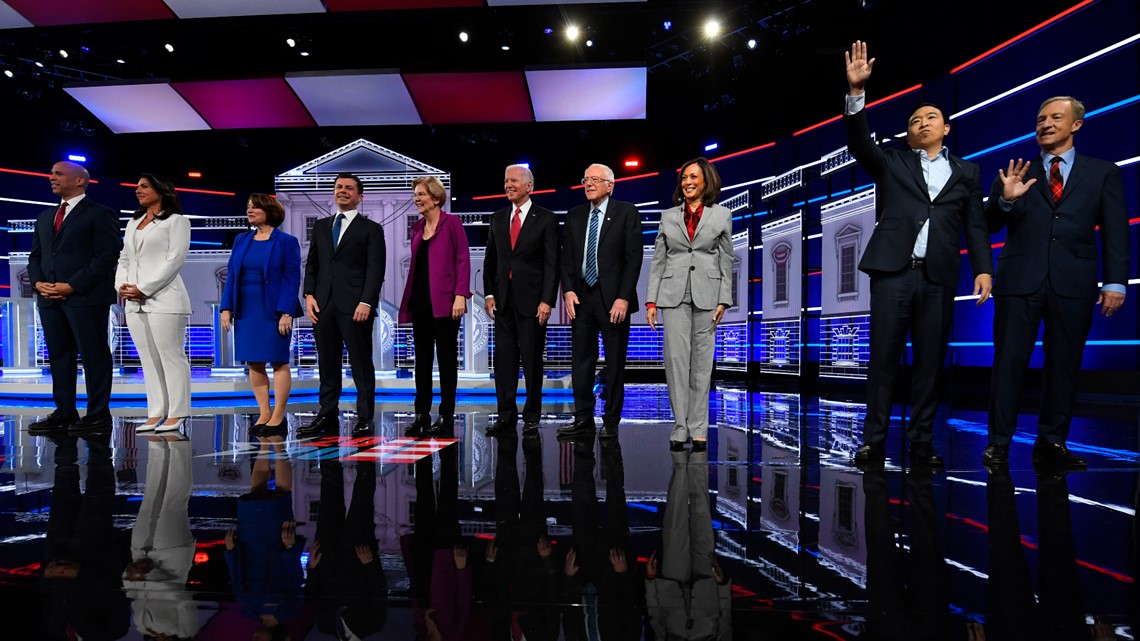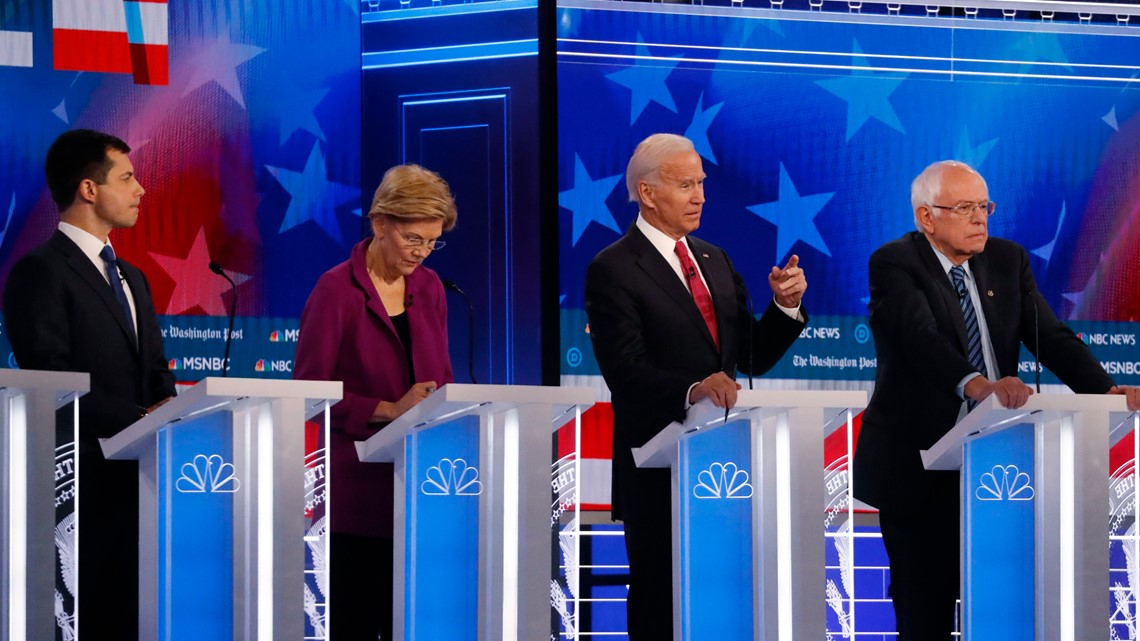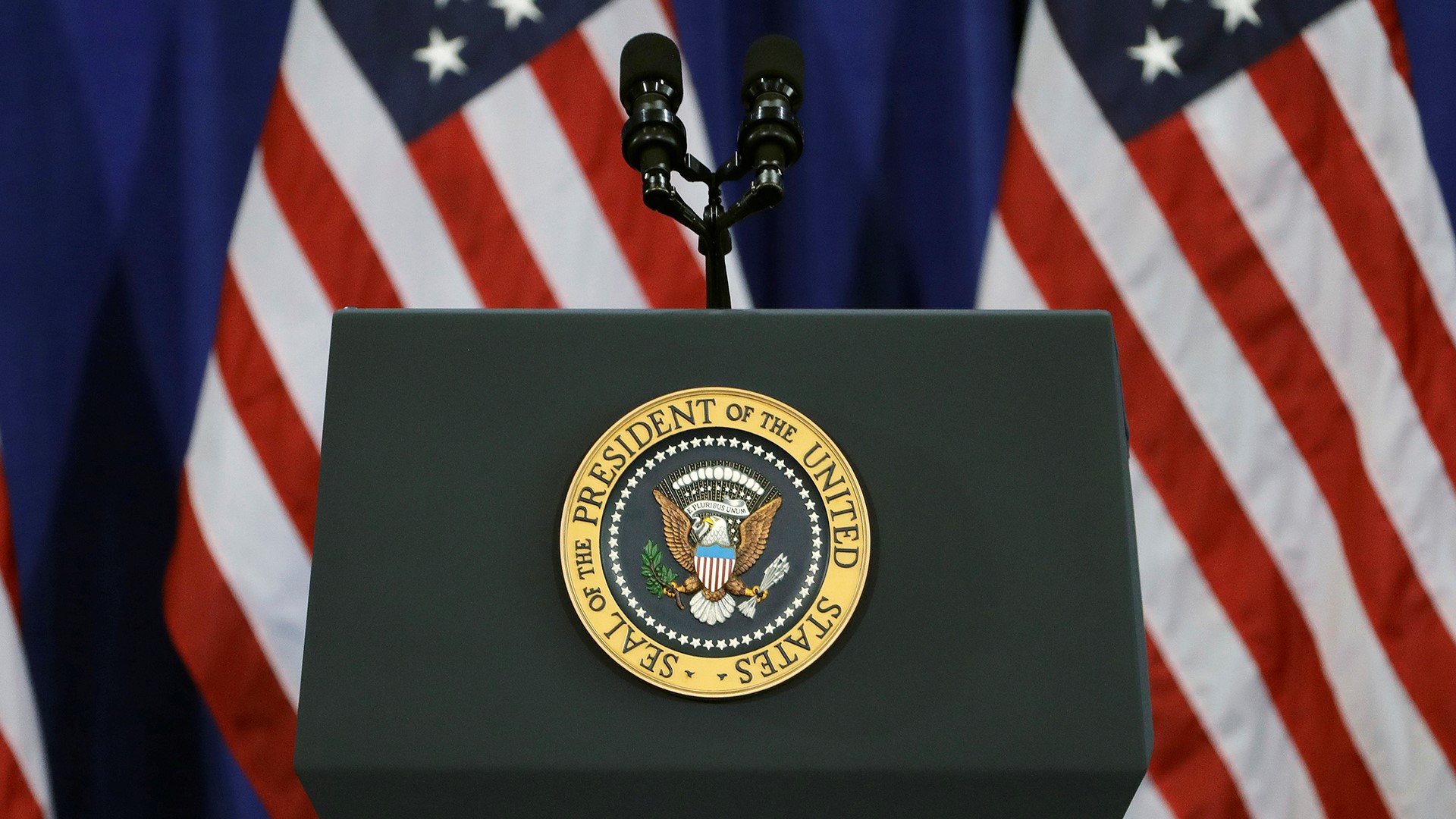ATLANTA — The top Democratic presidential candidates spent large chunks of prime-time television clashing over “Medicare for All” — again.
Like a string of previous debates, Wednesday’s prominently featured squabbles over a program that could alienate general-election swing voters who may be wary of fully government-run, universal health care and that will be extraordinarily difficult to get through Congress — even if Democrats take the White House and make significant 2020 congressional gains.
The latest faceoff, in Atlanta, came against the backdrop of impeachment consuming Washington, President Donald Trump making major foreign policy moves and well-known Democrats having left — or recently joined — the race. But the White House hopefuls just couldn’t stop debating Medicare for All, in part because it represents an important ideological divide between progressive candidates and moderates but also because the party sees health care as a winning issue — especially after it helped Democrats win the House last year.
Sens. Elizabeth Warren of Massachusetts and Bernie Sanders of Vermont, the race’s strongest progressive voices, staunchly defended Medicare for All.
“The American people understand that the current health care system is not only cruel, it is dysfunctional,” Sanders said.


Former Vice President Joe Biden said many people are happy with private insurance through their jobs, while Mayor Pete Buttigieg of South Bend, Indiana, complained about others taking “the divisive step” of ordering people onto universal health care, “whether they like it or not.”
The debate came at a critical juncture for the Democratic Party — less than three months before the first voting contests and with big questions hanging over the front-runners. Some Democrats have grown worried about Biden’s durability, while others fear that Warren and Sanders are too liberal to win a general election. Those concerns have prompted former Massachusetts Gov. Deval Patrick to launch a late bid for the nomination, with former New York City Mayor Michael Bloomberg expected to jump in as well in the coming days.
In the moderators’ chairs were four women, including Rachel Maddow, MSNBC’s liberal darling, and Ashley Parker, a White House reporter for The Washington Post. It’s only the third time a primary debate has been hosted by an all-female panel to date.
Buttigieg was asked early about how being mayor of a city of 100,000 residents qualified him for the White House, and he said he was more than up to the challenge.
“I know that from the perspective of Washington, what goes on in my city might look small,” Buttigieg said. “But frankly, where we live, the infighting on Capitol Hill is what looks small.”
Going into Wednesday’s debate, it seemed that Buttigieg, who has been rising in recent polls, would be a key target for attacks as his rivals tried to blunt his momentum. But other than the early question about his credentials, few candidates took many shots at him.
That could reflect the fact that candidates who previously have hit the front-runners hard have seen it backfire. Harris was very critical of Biden for once working with segregationist senators and saw a small bump in the polls quickly vanish. Former Obama administration housing chief Julián Castro had been tough on Biden but failed to qualify for Wednesday night’s debate.
A memorable exchange occurred when Biden — who was absent for large periods of the debate and didn't face any real attacks from his rivals — was asked about curbing violence against women and responded awkwardly, “We have to just change the culture. Period. And keep punching at it. And punching at it. And punching at it.”
Another clash erupted early between two candidates with relatively low polling who were looking for big moments: Sen. Kamala Harris of California and Hawaii Rep. Tulsi Gabbard, who has criticized prominent Democrats, including 2016 nominee Hillary Clinton.
"I think that it's unfortunate that we have someone on the stage who is attempting to be the Democratic nominee for the president of the United States who during the Obama administration spent four years full time on Fox News criticizing President Obama,” Harris said.
“I'm not going to put party interests first,” Gabbard responded.
But the discussion kept finding its way back to Medicare for All, which has dominated the primary — especially for Warren. She released plans to raise $20-plus trillion in new government revenue on universal health care. But she also said implementation of the program may take three years — drawing criticism both from moderates like Biden and Buttigieg, who think she’s trying to distance herself from an unpopular idea, and Sanders supporters, who see the Massachusetts senator’s commitment to Medicare for All wavering.
Sanders made a point of saying Wednesday that he’d send Medicare for All to Congress during the first week of his administration.
The latest debate also comes amid an impeachment inquiry, with testimony in the House continuing almost until the candidates took the stage. The top Democrats running for president support Trump’s impeachment, leaving little room for disagreement. But Biden has long argued that Trump is most nervous about the prospect of running against him in 2020 — and said so again Wednesday.
New Jersey Sen. Cory Booker faced especially intense pressure since he’s yet to meet the Democratic National Committee’s polling requirements for the December debate in California. He spent several minutes arguing with Warren about the need to more appropriately tax the wealthy, but also called for “building wealth” among people of color and other marginalized communities.
“We’ve got to start empowering people,” Booker said.
Businessman Andrew Yang was asked what he would say to Russian President Vladimir Putin if he got the chance — and Yang joked about that leader’s cordial relationship with Trump.
“First of all, I’d say I’m sorry I beat your guy,” Yang grinned, drawing howls of laughter from the audience.
___
Weissert and Colvin reported from Washington.



